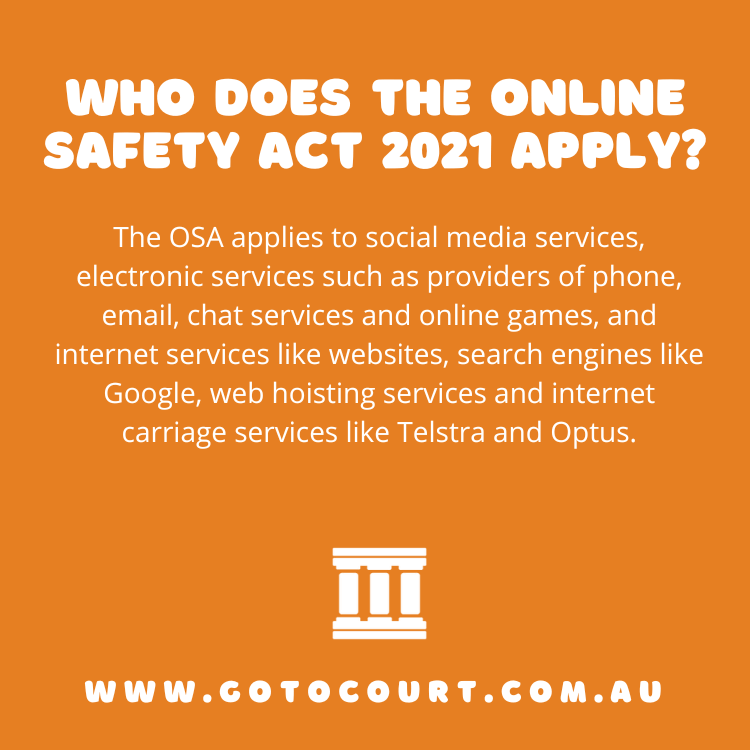Call our lawyers
now
or,
have our lawyers
call you
Online Bullying Laws in Australia
Updated on Nov 25, 2022 • 5 min read • 468 views • Copy Link
Online Bullying Laws in Australia
In Australia, both state and federal laws exist to address cyberbullying and other harmful behaviour that occurs online. At the federal level, the Online Safety Act 2021 (OSA) regulates online behaviour and sets up civil remedies for cyber-bullying and the posting of offensive material online. At state and territory level, criminal offences also exist in relation to cyber-bullying. This page deals with the federal scheme for addressing online behaviour including bullying.
Who does the Act apply to?

The OSA applies to social media services, electronic services such as providers of phone, email, chat services and online games, and internet services like websites, search engines like Google, web hoisting services and internet carriage services like Telstra and Optus.
The eSafety Commissioner and online bullying
The Office of the eSafety Commissioner was established in 2015 as the Office of the Children’s eSafety Commissioner. Its role was to help safeguard Australian children from online bullying. The Office subsequently become the Office of the eSafety Commissioner.
The OSA gave the eSafety Commissioner new responsibilities and powers, including promoting online safety, building awareness of online safety and monitoring and promoting compliance with the Online Safety Act.
Core expectations
Section 46 of the Online Safety Act sets out the core expectations for services providers.
These are as follows:
- That the service provider will take reasonable steps to ensure the service can be used safely;
- That the service provider will consult the Commissioner to determine what are reasonable steps;
- That the service provider will take reasonable steps to minimise the extent to which cyber-bullying material, non-consensual intimate images and abhorrent violent conduct material is available on the service;
- That the service provider will take reasonable steps to ensure measures to prevent children from accessing class 2 material are in place;
- That the service has clear mechanisms for complaints about cyber-bullying material, non-consensual intimate images and abhorrent violent conduct material;
- That the service has clear mechanisms for reporting breaches of its terms of use;
- That the service provider will comply with a request from the Commissioner to set out the number of complaints that have been made about breaches of the service’s terms of use;
- That the service provider will comply with a request from the Commissioner that it provide the details of any removal notices received within a specified period and how long it took to comply with them;
- That the service provider will comply with a request from the Commissioner to provide information about the measures taken to ensure end-users can use the service safely.
Service providers may be required to report to the Commissioner on their compliance with these core expectations. Civil penalties will apply if they do not do so.
Abhorrent violent material
Abhorrent violent material is audio, visual, or audio-visual material that depicts a person engaging in a terrorist act, a murder or attempted murder, a rape, kidnap or torture.
The Commissioner can request a service provider to disable access to abhorrent violent material by taking various steps such as blocking url addresses, blocking IP addresses and blocking domain names.
A blocking request can remain in force for up to three months.
Non-consensual sharing of intimate images
Under section 75 of the Online Safety Act, a person who posts or shares intimate images of another person without their consent may be liable to a civil penalty of a fine of up to 500 penalty units.
A person may make a complaint to the Commissioner about an intimate image that has been posted or shared online. If the Commissioner is satisfied that the person depicted in the image did not consent its provision online, it may give the provider of the service a written notice to remove the image from the service.
If the Commissioner decides not to provide a written notice to the service provider, it will advise the complainant of this decision.
Cyber-abuse
A person may make a complaint to the Commissioner about cyber-abuse material that has been provided on a social media service, electronic service or designated internet service. A person may also make a complaint on behalf of another person if the other person has authorised them to do so.
If the Commissioner is satisfied that the material is cyber-abuse material, it may give the service provider a written notice to remove the material with 24 hours, or within a longer period.
The Commissioner may also give a removal notice to an end-user requiring them to remove the material from the service within 24 hours, or within a longer period.
The Commissioner may also give a removal notice to a hosting service provider requiring them to cease hosting the material within 24 hours, or within a longer period.
If a person does not comply with a removal notice they may receive a civil penalty of a fine of up to 500 penalty units (section 91, Online Safety Act).
If you require legal advice or representation in any legal matter, please contact Go To Court Lawyers.


Affordable Lawyers
Our Go To Court Lawyers will assist you in all areas of law. We specialise in providing legal advice urgently – at the time when you need it most. If you need a lawyer right now, today, we can help you – no matter where you are in Australia.How It Works








1. You speak directly to a lawyer
When you call the Go To Court Legal Hotline, you will be connected directly to a lawyer, every time.


2. Get your legal situation assessed
We determine the best way forward in your legal matter, free of charge. If you want to go ahead and book a face-to-face appointment, we will connect you with a specialist in your local area.


3. We arrange everything as needed
If you want to go ahead and book a fact-to-face appointment, we will connect you with a specialist in your local area no matter where you are and even at very short notice.












